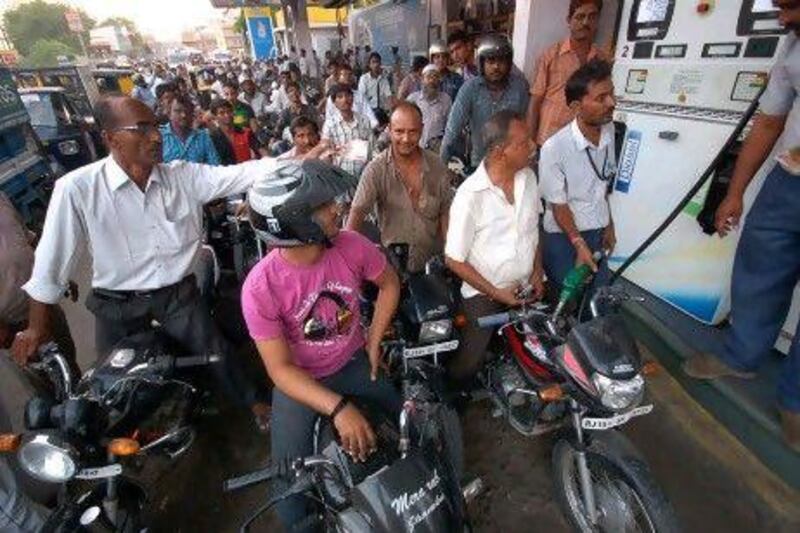NEW DELHI // The Indian prime minister, Manmohan Singh, has hinted at reforms to revive the country's economy and to restore the tarnished image of his government as it enters its final two years.
Mr Singh, who took over the finance portfolio a week ago after the previous finance minister, Pranab Mukherjee, stepped down to run for president, has called for measures to "revive the animal spirits of the economy".
In meetings with ministry officials and economic planners, Mr Singh said: "Millions of our countrymen look up to the government to throw open channels for their progress, prosperity and welfare … We need to work to get the economy going again."
No policy changes have been made, although analysts expect some new measures to be initiated over the next few weeks.
Mr Singh's statements have come in the midst of what he has called "a climate of pessimism".
The Indian rupee has fallen 21 per cent over the past year, floating between 55 and 56 rupees to the dollar. India's fiscal deficit stood at 5.7 per cent of gross domestic product in 2011-12.
Economic growth has slowed to 6.5 per cent this fiscal year, and the rate of inflation hovered at about 7.5 per cent in May.
Dramatic economic reforms will call to mind the Manmohan Singh of 1991, when as finance minister he initiated economic changes, triggering rapid growth and pulling India back from a dire fiscal precipice.
A new surge in economic growth will also help Mr Singh's Congress party ahead of the general elections in 2014. Congress, which heads the coalition government, has been damaged by a series of corruption scandals and by administrative inefficiency.
"With an eye on the elections, they could be thinking: 'How do we change our manifesto, our pitch to the voter?'" said Mohit Satyanand, a New Delhi-based economist and consultant to serveral companies. But the path of economic reform is choked with political complications - from within the Congress party, as Mr Satyanand pointed out - but also from coalition allies and from the opposition.
On Monday, the finance ministry rolled back a service tax levy on certain classes of railway travel and freight services, under pressure from a coalition ally named the Trinamool Congress.
"Whether or not there will be any reforms depends on how much Manmohan Singh is willing to face down the Congress party establishment to secure his own place in history," said Nitin Pai, a fellow at the Takshashila Institution, an independent Chennai-based think tank.
Mr Singh is expected to cut the government subsidies of petrol and diesel, and to scale back a controversial taxation measure that was in this year's budget.
Analysts have speculated that he will exempt participatory notes entirely from this taxation measure. Participatory notes are instruments issued by the government to foreign institutional investors, who can then invest in the Indian stock market without registering with India's exchange regulatory body.
But Mr Pai called these moves "mere signalling".
"The fundamental strengths of the economy can be reinforced only by liberalising education, labour laws, and land acquisition," Mr Pai said. "He must do what is necessary to revive direct investment, both domestic and foreign."
Mr Satyanand noted that Mr Singh's reforms in 1991 also came in different circumstances.
"Basically, at that time, it was a crisis situation. We were down to a couple of weeks of foreign exchange, and so the reforms were directed by the International Monetary Fund and the World Bank," Mr Satyanand said. "Even though things aren't great now, I don't think we are in that kind of situation."
Mr Singh's options, at this stage, are limited, said Mr Pai.
"What Manmohan Singh can do at this stage is revive the narrative of reforms, by setting out a long-term road map and by implementing the reforms that he can," he said. "The signal this will send will help set the economy back on track and hopefully redeem his record."





